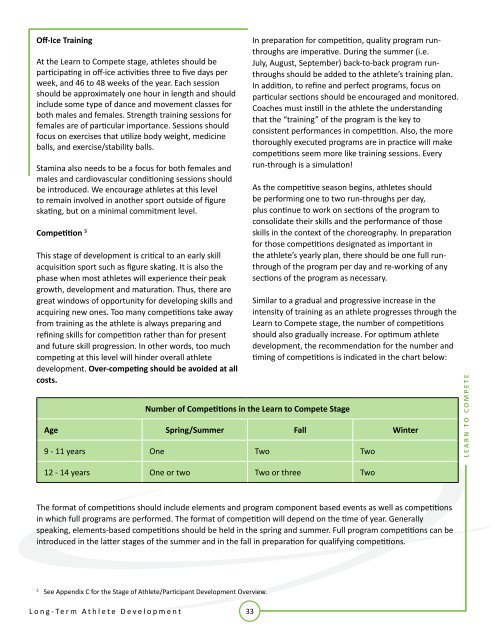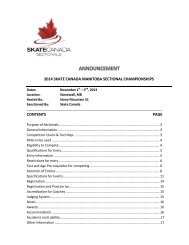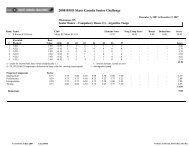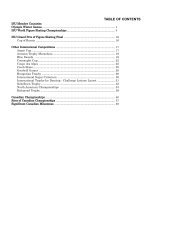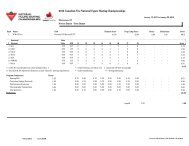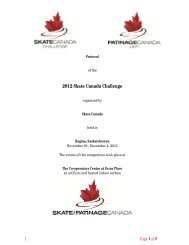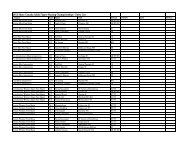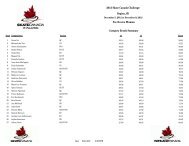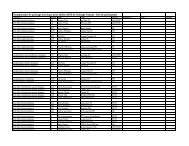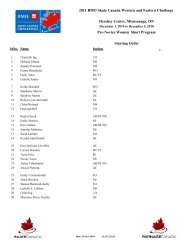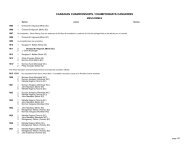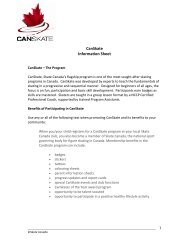LONG-TERM ATHLETE DEVELOPMENT - Skate Canada
LONG-TERM ATHLETE DEVELOPMENT - Skate Canada
LONG-TERM ATHLETE DEVELOPMENT - Skate Canada
Create successful ePaper yourself
Turn your PDF publications into a flip-book with our unique Google optimized e-Paper software.
Off-Ice Training<br />
At the Learn to Compete stage, athletes should be<br />
participating in off-ice activities three to five days per<br />
week, and 46 to 48 weeks of the year. Each session<br />
should be approximately one hour in length and should<br />
include some type of dance and movement classes for<br />
both males and females. Strength training sessions for<br />
females are of particular importance. Sessions should<br />
focus on exercises that utilize body weight, medicine<br />
balls, and exercise/stability balls.<br />
Stamina also needs to be a focus for both females and<br />
males and cardiovascular conditioning sessions should<br />
be introduced. We encourage athletes at this level<br />
to remain involved in another sport outside of figure<br />
skating, but on a minimal commitment level.<br />
Competition 5<br />
This stage of development is critical to an early skill<br />
acquisition sport such as figure skating. It is also the<br />
phase when most athletes will experience their peak<br />
growth, development and maturation. Thus, there are<br />
great windows of opportunity for developing skills and<br />
acquiring new ones. Too many competitions take away<br />
from training as the athlete is always preparing and<br />
refining skills for competition rather than for present<br />
and future skill progression. In other words, too much<br />
competing at this level will hinder overall athlete<br />
development. Over-competing should be avoided at all<br />
costs.<br />
L o n g - Te r m A t h l e t e D e v e l o p m e n t<br />
Phone 613.747.1007 I Toll Free 1.888.747.2372 I Fax 613.748.5718 I Toll Free Fax 1.877.211.2372<br />
Number of Competitions in the Learn to Compete Stage<br />
In preparation for competition, quality program runthroughs<br />
are imperative. During the summer (i.e.<br />
865 Sheord Road, Ottawa, Ontario K1J 1H9<br />
July, August, September) back-to-back program runthroughs<br />
should be added to the athlete’s training plan.<br />
In addition, to refine and perfect programs, focus on<br />
particular sections should be encouraged and monitored.<br />
Coaches must instill in the athlete the understanding<br />
that the “training” of the program is the key to<br />
consistent performances in competition. Also, the more<br />
thoroughly executed programs are in practice will make<br />
competitions seem more like training sessions. Every<br />
run-through is a simulation!<br />
Age Spring/Summer Fall Winter<br />
9 - 11 years One Two Two<br />
12 - 14 years One or two Two or three Two<br />
33<br />
As the competitive season begins, athletes should<br />
be performing one to two run-throughs per day,<br />
plus continue to work on sections of the program to<br />
consolidate their skills and the performance of those<br />
skills in the context of the choreography. In preparation<br />
for those competitions designated as important in<br />
the athlete’s yearly plan, there should be one full runthrough<br />
of the program per day and re-working of any<br />
sections of the program as necessary.<br />
Similar to a gradual and progressive increase in the<br />
intensity of training as an athlete progresses through the<br />
Learn to Compete stage, the number of competitions<br />
should also gradually increase. For optimum athlete<br />
development, the recommendation for the number and<br />
timing of competitions is indicated in the chart below:<br />
The format of competitions should include elements and program component based events as well as competitions<br />
in which full programs are performed. The format of competition will depend on the time of year. Generally<br />
speaking, elements-based competitions should be held in the spring and summer. Full program competitions can be<br />
introduced in the latter stages of the summer and in the fall in preparation for qualifying competitions.<br />
5 See Appendix C for the Stage of Athlete/Participant Development Overview.<br />
L E A R N T O C O M P E T E


